I'm never too proud to admit a mistake, and my first session with this tea was what is technically known as a "balls-up".
Thanks so much to Nada for this cake, pictured left in the above photograph. As with its sister cake (the 2007 Shi'er Xiansheng "Weizhongwei Menghai"), this is exceedingly tight in its compression. Therein lies both cause and consequence of my errors with this tea.
As can be seen, the leaves are pleasant, tending towards the smaller sizes, and are rather fragmented. This is pu'er of the Old School, of which the 12 Gentlemen are proud to produce. Their manifesto is printed on the ticket below, which takes the prize for the most well-worded and correctly-engrammarised of any neipiao [inner ticket] that I have ever come across:
...though sometimes I miss the heady bygone days of "the greater mellowness the more time".
My first session used clumsy force to break out some chunks of leaves from the tight cake. The result tasted appalling.
My second session was an attempt to redeem this tea: I was exceedingly careful, slowly working just the tip of the pu'erdao between layers, from all angles, until a small section of leaves could be lifted from the bing.
That first session resulted in lots of sediment in the hulu [gourd filter], and a curiously dark orange soup, which was so cloudy that it looked almost milky. The tea was bitter in the extreme. Removing leaves from the pot did not improve matters, and the whole affair was thin in texture, and low on flavour.
My first session used clumsy force to break out some chunks of leaves from the tight cake. The result tasted appalling.
My second session was an attempt to redeem this tea: I was exceedingly careful, slowly working just the tip of the pu'erdao between layers, from all angles, until a small section of leaves could be lifted from the bing.
That first session resulted in lots of sediment in the hulu [gourd filter], and a curiously dark orange soup, which was so cloudy that it looked almost milky. The tea was bitter in the extreme. Removing leaves from the pot did not improve matters, and the whole affair was thin in texture, and low on flavour.
The second session was like a completely different tea: a wonderfully cooling sensation came from the leaves, testifying to their laoshu [old tree] status. The flavour was a complex blend of charming Yiwu sweetness and rich honey, right from the first infusion. Some ku [bitterness] was present, but only in a well-balanced proportion in the finish, to provoke some serious mouth-watering.
The entire second session was a revelation, and I walked away i) relieved; ii) highly enamoured of this fine tea.
A catalogue of my original failures, and my consequent revisions, may be seen below (as always, clicking on the image will provide a more easily-read large version):
The entire second session was a revelation, and I walked away i) relieved; ii) highly enamoured of this fine tea.
A catalogue of my original failures, and my consequent revisions, may be seen below (as always, clicking on the image will provide a more easily-read large version):
This was a real education. I learned a lot about brewing tea from this cake, or rather, in the effect of leaf-damage on the resultant tea session. It seems that there really can be no saving a session if inadequate care and patience are shown with the knife.
It reminds me of a similar lesson that I obviously did not learn well enough from some point last year: MarshalN kindly send a batch of 4-5 samples out to a number of folk, and I was fortunate enough to be included. At that stage in my brewing, I was typically using far too many leaves than was sensible. I used the majority of each sample for single sessions, and found the results to be unpalatable. These results were not published as there was simply no information to be gleaned from them, save from the fact that using too many leaves results in poor tea. I wasted some good teas, and didn't get any closer to deciding whether or not they were enjoyable. This nearly happened with this tea, and I count myself fortunate to have eventually learned a valuable lesson...
This is a tea that has achieved a certain "technical" excellence. Some teas are beautiful in the manner of a rough diamond: a natural ruggedness. Some teas are beautiful because they are rarefied and elegant. This tea is beautiful in a carefully-maintained and well-constructed fashion, like the careful lines of a pre-Raphaelite.
The Shi'er Xiansheng are very much in control of the variables, it would appear, and the result is a technical success that remains thoroughly enjoyable. The whole rings cleanly and true like a well-tuned bell. Great stuff.
A third session: I sat down, expecting to be underwhelmed and disappointed, suspecting that my previous enthusiasm for this tea would be dampened. I was greatly surprised by the real enjoyment and obviously high quality of this offering. Complex, stuffed full of character, and long-lasting, this tea really took me by surprise, again. Tasty, tasty, tasty.
It reminds me of a similar lesson that I obviously did not learn well enough from some point last year: MarshalN kindly send a batch of 4-5 samples out to a number of folk, and I was fortunate enough to be included. At that stage in my brewing, I was typically using far too many leaves than was sensible. I used the majority of each sample for single sessions, and found the results to be unpalatable. These results were not published as there was simply no information to be gleaned from them, save from the fact that using too many leaves results in poor tea. I wasted some good teas, and didn't get any closer to deciding whether or not they were enjoyable. This nearly happened with this tea, and I count myself fortunate to have eventually learned a valuable lesson...
This is a tea that has achieved a certain "technical" excellence. Some teas are beautiful in the manner of a rough diamond: a natural ruggedness. Some teas are beautiful because they are rarefied and elegant. This tea is beautiful in a carefully-maintained and well-constructed fashion, like the careful lines of a pre-Raphaelite.
The Shi'er Xiansheng are very much in control of the variables, it would appear, and the result is a technical success that remains thoroughly enjoyable. The whole rings cleanly and true like a well-tuned bell. Great stuff.
A third session: I sat down, expecting to be underwhelmed and disappointed, suspecting that my previous enthusiasm for this tea would be dampened. I was greatly surprised by the real enjoyment and obviously high quality of this offering. Complex, stuffed full of character, and long-lasting, this tea really took me by surprise, again. Tasty, tasty, tasty.
Addendum
13 June, 2009
It's been over a year since I tasted these cakes - after a conversation with GV, who is considering buying some for storage, I thought I'd get reacquainted.
The iron-hard compression has eased quite noticeably (shown above). While still tight, it isn't quite as insanely tight as I remember, and it was easy to separate out plenty of leaves without causing breakage:
The leaves have darkened significantly during the past year, which you might be able to see if you compare the above photograph to the admittedly awful equivalents from last year.
Much has changed in the last year - I use a tetsubin-and-hotplate, and tend to leave my water out in a jug the night before a session.
Much has also remained the same - I use the same water as a year ago, the same pot, and presumably the same technique.
This tea has maintained a strong, creamy, grain-like character that I enjoy very much. I did not notice it before, but the maocha is a blend of autumn and spring leaves, and this is patently clear in the flavour: it has the bass, rich flavour of autumn combined with zesty, sweet Yiwu springtime.
Much has changed in the last year - I use a tetsubin-and-hotplate, and tend to leave my water out in a jug the night before a session.
Much has also remained the same - I use the same water as a year ago, the same pot, and presumably the same technique.
This tea has maintained a strong, creamy, grain-like character that I enjoy very much. I did not notice it before, but the maocha is a blend of autumn and spring leaves, and this is patently clear in the flavour: it has the bass, rich flavour of autumn combined with zesty, sweet Yiwu springtime.
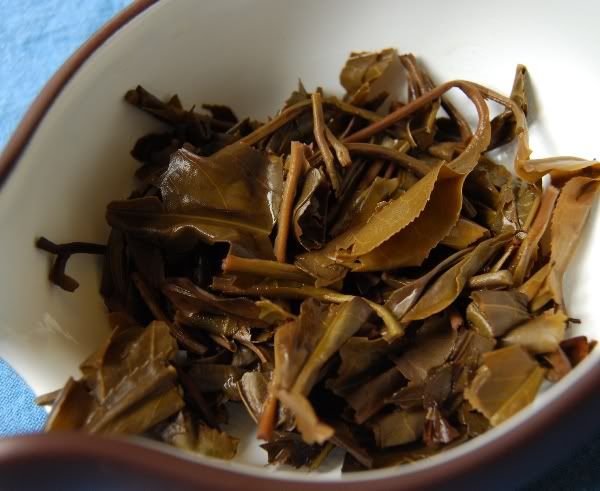
The quality of the leaves is very good. I previously wrote that they had been mulched, Taiwanese/Big Factory-style, but this is not the case. As may be seen above, the majority of the leaves are large fragments, or whole. They are thick and healthy, which is encouraging.
I don't believe that I used enough leaf this time around. There was just a hint of plantation roughness in the end session (around the 15th), but the majority were smooth, indicating a decent blend. This absence of roughness should have allowed me to beef up the leaf quantity, but I played it very conservatively because of my initial experiences, written above, in which it came out very bitter.
One year later, and I find it to be smooth and flavoursome, and would benefit from using plenty of leaf. It hasn't so much aged, so as much as left its infancy. It's nice to see it getting darker, however.
I don't believe that I used enough leaf this time around. There was just a hint of plantation roughness in the end session (around the 15th), but the majority were smooth, indicating a decent blend. This absence of roughness should have allowed me to beef up the leaf quantity, but I played it very conservatively because of my initial experiences, written above, in which it came out very bitter.
One year later, and I find it to be smooth and flavoursome, and would benefit from using plenty of leaf. It hasn't so much aged, so as much as left its infancy. It's nice to see it getting darker, however.


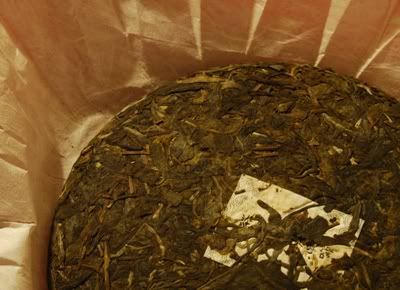
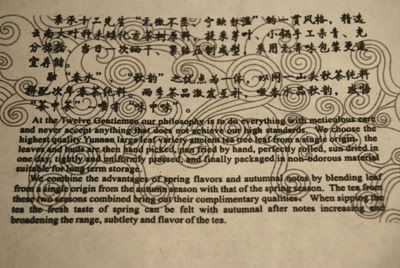
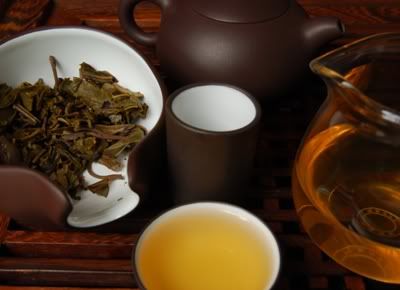
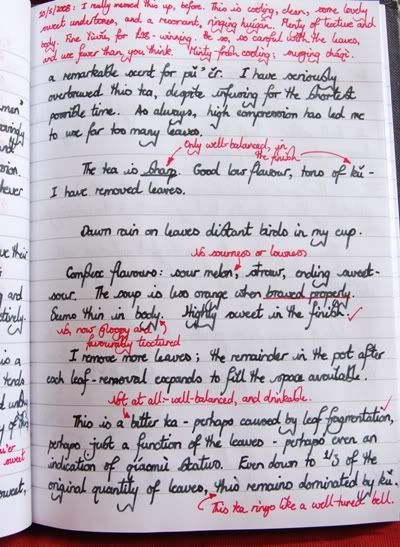
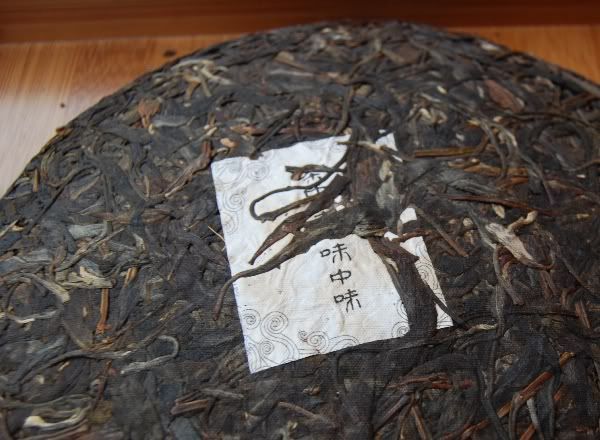
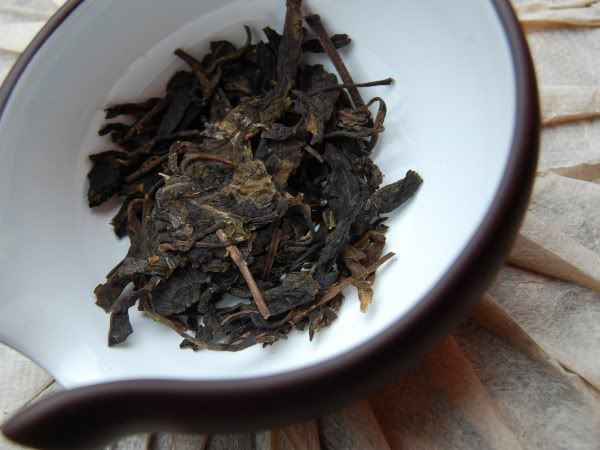
11 comments:
Your experience leads to the obvious question... why such a tight compression?
These 12 Gentlemen seem to work in an intentional & thoughtful manner (as is true of all gentlemen), and the NeiPiao Manifesto even suggests that the tight compression is intentional. Why? What characteristic is gained/avoided by creating lead from leaves?
Dear David,
Well, good question - that's one that we were pondering previously in the comments to the 2007 Menghai from the same producers. Nada observed that they intend the tea to age slowly, hence the tight compression, in order to achieve what they consider to be the peak of its aging potential. Such is my understanding of their intentions.
It certainly tastes nice, though. :)
Toodlepip,
Hobbes
Thank you for the re-direct. That's what happens when I turn my back on a conversation.
I'm still fairly skeptical of the tight compression claim. Historically speaking, the only thing as tightly packed are Xiaguan produced teas, and almost everybody thinks those age too slowly, if anything. 15 years of dry storage in a place like Hong Kong and the tea is only barely drinkable.
So... if their goal is to preserve the taste of the tea, then yes, strong compression is good. If the goal, however, is to let it age gracefully, I fear that this might be overkill, especially if they're mostly stored in a dry and cool place like Kunming.
Dear MarshalN,
I liked the way Nada put it before - the world of pu'er is large enough for all possibilities of manufacture. I rather like the idea of trying so many combinations of variables empirically. If it works, excellent - if it doesn't work, there are plenty of alternative factories. Bring on the experiments, I say!
Toodlepip,
Hobbes
Please don't get me wrong -- there's nothing wrong at all with experimentation.
I just think claiming that something will age optimally while not knowing whether that is true or not is not exactly responsible behaviour.
Yes, it would be too bold to claim "this is the way", I do agree.
This is a perfect example of what happens if one doesn't spend enough time with tea. One should always get to know tea and nurture a relationship with it before making a statement about its true nature.
Of course this is not always possiable with small samples.
Thanks once again for this wonderful post that examines so many different issues about tea.
It takes a strong person to admit wrong.
Peace
Dear Matt,
Thanks muchly! I agree that time is needed to coax the best out of the leaves. I generally find that two or three sittings with a tea allows me to get a fairly decent idea of its character - thankfully, that's about how many sessions the average sample stretches, too. It's generally easier with simpler teas, of course - less to hide. :)
Toodlepip,
Hobbes
Dear Hobbes,
great many thanks for the update.
In fact I was recently considering getting one of these bings (opted for the 2007 12G Menghai instead).
Based on a 25g sample my impressions of this Yiwu were similar and dissimilar to yours.
Very good quality mostly wholish leaves, yes. Semi-hard compression, yes. Clean, smooth - exceedingly so.
But on the whole I am underwhelmed. For me this tea just lacks intensity and presence. It has little aroma even in the xiangbei, and little flavour at what in vinous talk we call 'mid-palate'. On the other hand, it has some lovely clean unbitter firmness on the finish.
Is it enough? Is it just too young to be in an 'expressive' stage? (The parallel 2007 Menghai surely isn't).
My technique and experience are surely very humble against yours. Looking at your pictures - I am getting a darker, less yellow brew than yours, so was wondering about your dosage and infusion times. I've had 4 sessions so far but the best was dosing high (7g) in ~130ml xishi pot, with 15, 15, 30, 45, 60, 60, 60s, 3m, 5m etc. Brews #3 through 9 were best (but I’m generally not a fan of excessive infusions).
Well, academic talk but I was wondering whether and how we can reconcile our views.
Best wishes from Poland
Dear Nerval,
Many thanks for the comment, and for sharing your experiences.
You know, I have come to appreciate that sometimes tea-views just simply cannot be reconciled! I've disagreed with many good friends as to the advantages or disadvantages of various teas, and have come to no conclusion regarding consensus - other than that it is hard to achieve. :)
I know of several folk whom share your opinion regarding this cake - and I know of several folk who tend towards my own. I think this just represents the variety of palates and methods of preparation out there.
Certainly, the tetsubin we use is highly complementary to this tea. Their characters fit almost seamlessly, and I can taste a lot of the kettle in this tea, enhancing the creamy, pleasant aspects of its body throughout. Other than that - your guess is as good as mine. :)
Toodlepip,
Hobbes
Post a Comment